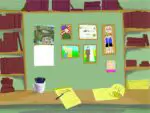With its surreal portrayal of time and its relationship to memory, “I May Destroy You” explores the weight of inner contemplation. Written, created and co-directed by Michaela Coel, “I May Destroy You” engages with personal traumas throughout the show’s premise.
Coel also stars as the main character, Arabella, who is a young author with an upcoming deadline. In an attempt to escape her writer’s block, Arabella goes to a bar to see some of her friends. Instead, the night is lost within a spiked drink and a fragmented memory of an assault Arabella cannot immediately place as something that has happened to her.
The story line was inspired by Coel’s own experience with sexual assault that occurred while writing her previous show “Chewing Gum.” In an interview with the New Yorker, Coel discusses the power of exploring the absurd through writing, using it as a way to disengage from trauma in order to better understand it. According to Coel, the show is driven by the power of introspection, and the role of personal control in understanding the mind. Arabella’s journey to grapple with her assault transforms into a production of power, conversing with the interpersonal nature of survival.
Vivid, yet removed from a cohesive grasp on reality, “I May Destroy You” weaves in and out of the lives of Arabella, and her two closest friends: Terry (Weruche Opia) and Kwame (Paapa Essiedu). As Arabella comes to terms with her own sexual assault, Terry and Kwame face sexual assault in their own lives.
However, these instances of sexual violence detach from what is socially understood as examples of sexual assault, providing an examination of a social inability to grasp the depths of trauma. Similarly, Arabella, Terry and Kwame witness the ways in which their perceptions of sexual boundaries have become co-opted with society’s oversimplification of the dangerous range of sexual assault.
This aspect of the show interacts with the responsibility of friendship amongst 20-somethings; it explores the implications of trauma within platonic relationships. Arabella, Terry and Kwame are devoted to one another, at times hiding their own traumas in an effort to be supportive. Yet, between the three of them, their interactions signal the unknowing similarities between their experiences. The importance friendships hold within “I May Destroy You,” alongside the emphasis of consciousness, signifies the way in which the mind can distort reality.
This leads into a presentation of coping mechanisms, something that may deeply resonate with the show’s viewers. Arabella wakes up the morning after her assault with a gash on her face, a cracked phone and a set of disturbing, yet fragmented memories. She initially believes that she has witnessed something happen to somebody else, and attempts to piece together the previous night.
When she does begin to process her memories as something she has directly experienced, she begins to try and minimize the personal damage, repeating phrases such as, “There are hungry children” and “There is a war in Syria” over and over again. This method of coping converses with the greater arc of the show, particularly the way in which a loss of control directly correlates to mental stability.
Although the show deals with heavy and triggering subject matter, Coel’s personal ties to the story allow for the dark and surreal nature of the narrative to converge with a dry and distinct element of humor. In alignment with Arabella’s fractured memories, the distorted presentation of time and memory challenge conventional depictions of adulthood.
The artistic and stylistic choices of Coel, particularly the soundtrack of the show, further aim to understand the ambiguous nature of the storyline by allowing musical choices to reflect personal characterization. Ranging from artists like Tierra Whack, Arlo Parks and Janelle Monáe, the music within “I May Destroy You” pairs isolation with joy, establishing a spectrum of emotions — a spectrum that functions as a reminder of the capability of personal and individual emotional release.
At a visual level, the show’s overall structure reiterates the lure of obscurity — a buzzing noise continually pulls Arabella out of consciousness as she faces triggers of her assault. A poster in her room continues to fall down alongside painful moments of recollection.
“I May Destroy You” is a show that understands confusion as a necessary aspect of adulthood, particularly in relationship to trauma. The show begins with a clear example of sexual assault, but then transitions into a depiction of the variety of ways in which sexual assault can manifest. Arabella and her two closest friends, Terry and Kwame, experience sexual assault in settings that have disguised themselves as safe.
The three are left with the challenge of piecing together their experiences while supporting each other emotionally. With pushed boundaries presented under the guise of empowerment that reveal the way in which society is unwilling to understand the scope of sexual assault, “I May Destroy You” explores how these traumas operate within friendships, either with the love and support that can occur in those dynamics, or the way in which abusive people can manipulate the reality of their survivors.
Arabella’s boyfriend is quick to blame the assault on her accepting a drink from a man at a bar. Kwame, a gay man, tries to report his assault to police, only to be ignored. Terry, an aspiring actress, struggles with the ability to confide in her friends an experience she initially perceived as empowering.
“I May Destroy You” is rooted in the authenticity of Coel’s artistic process. After the completion of “Chewing Gum,” Coel turned down a $1 million offer from Netflix after they refused to let her have any percentage of the show’s rights. Now, Coel is in full control of designing her own artistic direction of her work. This makes the show an incredibly personal project, presenting the true power writing can hold.
As an aspiring writer myself, seeing how Coel incorporated her own life and experiences into both a written and visual project, initiates the power of emotional intimacy and honesty that strong writing is all about. “I May Destroy You” toys with memory and time, bringing past experiences to the forefront of current ones, demanding new notions of survival.
















